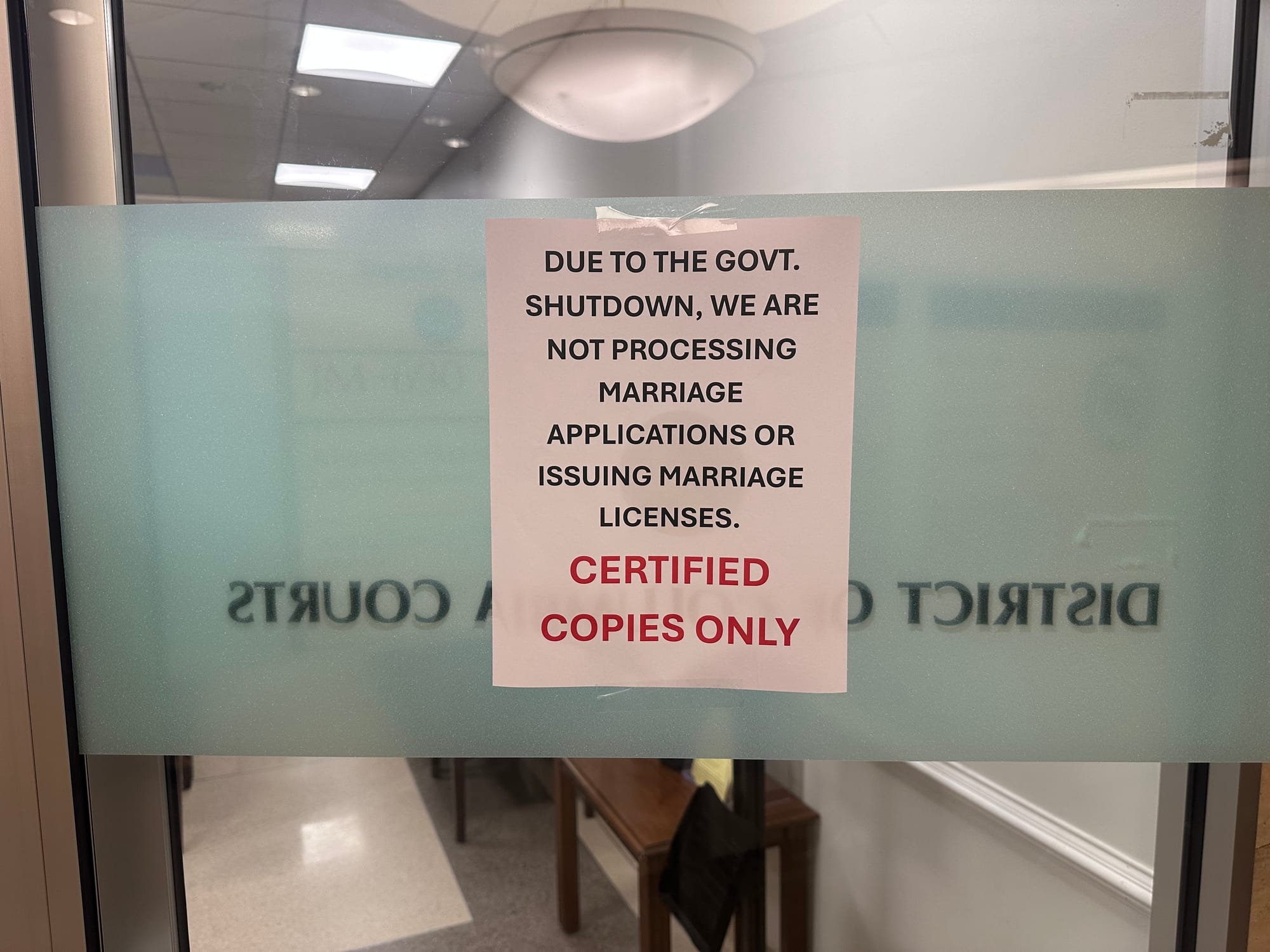Wilson Building Bulletin: A cold dose of reality on D.C.’s budget
And Trayon White gets a new trial date.
The congressional spending fight shuttered the office that issues marriage licenses in the city.

If you’ve ever had a wedding, you know that the last week before you exchange vows is a hectic sprint. Flower arrangements? Check. DJ? Booked and confirmed. Seating arrangements for dinner? Finalized and optimized to minimize family drama. Federal government: funded, open, and operating?
Wait, what?
Abigail and Christian aren’t members of Congress or experts in federal budgeting, but that question became oddly relevant to their nuptials this week. The Virginia couple had been planning their wedding for two years, a “big intimate party” at a historic house in Dupont Circle with family flying in from as far away as Texas and Mexico. “For us it was really important to get married in the city where we fell in love,” says Abigail.
Everything was set for Saturday, spare one important detail: a marriage license. They had submitted all the required paperwork to D.C. Superior Court’s Marriage Bureau in September, but when the federal government shut down on October 1, so too did the single office that issues the documentation needed to legalize any marriage that takes place in the District.
It’s another one of those only-in-D.C. situations: While Superior Court functions as the city’s local court, it is federally funded. During a shutdown, critical judicial functions like criminal trials continue, but non-essential personnel like those working in the Marriage Bureau are furloughed.
“That was definitely not something I had in the back of my mind,” admits Eunjee Koh, a D.C. resident whose impending wedding was unexpectedly complicated by the shutdown. “It’s very D.C.”

The city government has had to step in to make sure marriages can continue. The D.C. Council passed an emergency bill – the LOVE Act, or Let Our Vows Endure – last week that allows the city to issue marriage licenses during the federal government shutdown. And it’s not the first time it has had to do so; the same happened during the 35-day shutdown of 2018-2019, when D.C. issued 187 licenses.
On Tuesday, the newly-designated D.C. office sprang to life, and by late afternoon a half-dozen couples were waiting to submit their applications.
“We’ve had a steady flow all day,” said Victor Reid, the administrator of the D.C. Office of Documents and Administrative Issuances.
In 2023, there were more than 5,800 marriage licenses issued in D.C., or roughly 22 for every weekday of the year if they were spread out evenly. But September and October are the most popular months to get married, thanks to the mild weather.
When I asked a D.C. courts employee whether soon-to-be-wed couples were calling with questions and concerns, they responded: “All day, every day.” After two days in business, the office had issued 64 marriage licenses.
Of course, the closure of the Marriage Bureau is hardly the most painful part of the federal government shutdown. Millions of federal workers are going without pay, and may be for a while. Government contractors are similarly losing out on wages, but they also can’t rely on the expected back pay that feds usually get. And the Trump administration is using the shutdown as an excuse to conduct more mass layoffs of government workers, only compounding the regional pain.
But the fact that D.C. weddings have been caught up in a federal spending fight is, in many ways, sadly symbolic.
“In a way I was surprised, as most reasonable people would be,” says Eric, a Virginia resident who had been planning for months to have his wedding at the D.C. courthouse on Friday. “But it sunk in as another reminder of the lack of power that local D.C. has over its own affairs.”
That’s even more the case when you consider that D.C. residents don’t even have a say in the funding fight that has shuttered the government; they have no voting representation in Congress, after all.
Meanwhile, delaying or derailing legal marriages can have real impacts. A lack of a license can be “highly disruptive… where residents’ access to certain services or benefits are contingent on their timely marriage,” Mayor Muriel Bowser said last week.
One couple seeking a marriage license in the D.C. office on Tuesday needed the document to start immigration-related paperwork. In another, one person had been laid off from her job at the State Department, and was looking to accelerate planned nuptials in order to get on her fiancé's health insurance.
“Thankfully, with our case, we don't have any immigration case pending or anything like that that would rely on a marriage license, or health insurance,” Abigail told me as she and Christian came out of the D.C. office. “But we know that there are a lot of people that need that legal information to be able to move on those processes.”
For Eric, the shutdown has left him and his fiancée scrambling not just for a license, but for a venue; they were supposed to get married in the Marriage Bureau’s small ceremonial room. D.C. officials tell me that they are hoping to offer space for on-the-spot weddings, potentially at the Wilson Building, but it hasn’t been finalized yet.
“In two years this will just be another, ‘You’re not going to believe this’ story. It wasn’t a crazy uncle that stopped the wedding, it was the government shutdown,” Eric says. “Being able to say that will eventually be funny, but right now we have to get through this mess.”
With your help, we pursue stories that hold leaders to account, demystify opaque city and civic processes, and celebrate the idiosyncrasies that make us proud to call D.C. home. Put simply, our mission is to make it easier — and more fun — to live in the District. Our members help keep local news free and independent for all: